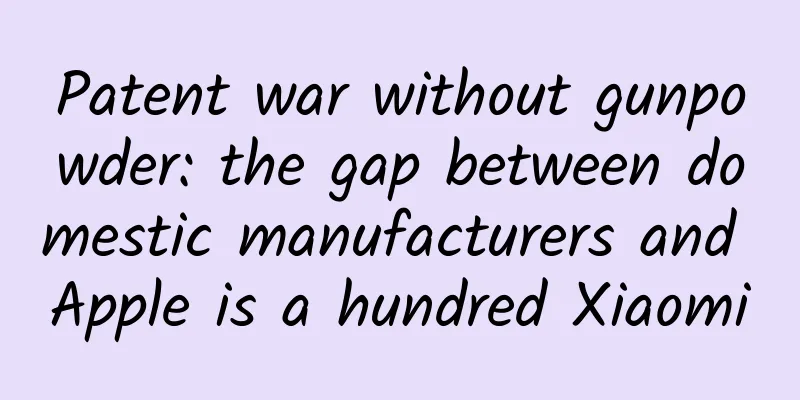Patent war without gunpowder: the gap between domestic manufacturers and Apple is a hundred Xiaomi

|
In recent years, the domestic mobile phone market has been developing rapidly, and patent issues have become increasingly prominent. As early as December 5, 2014, Ericsson sued Xiaomi in India for infringing on its eight patents in ARM, EDGE, 3G and other related technologies. Recently, on June 30, 2016, chip giant Qualcomm once again sued Meizu, claiming that it infringed on its WCDMA/CDMA2000 3G, LTE 4G wireless communication standards related patents, and demanded a claim of 17 million yuan. Perhaps under the influence of this incident, vivo reached new 3G and 4G Chinese patent licensing agreements with Qualcomm on August 7, respectively. The deterrent effect of patents is evident. In the current market environment, domestic manufacturers pay more and more attention to patents, but there is still a big gap compared with the long-established European and American manufacturers. Patents have also become a huge obstacle for domestic mobile phone manufacturers to expand overseas. What is a patent war and who are the beneficiaries of the patent war? In fact, in the news in recent years, it is not difficult to find many reports of lawsuits between two parties due to patent infringement issues. Among them, the most eye-catching is the patent war between Samsung and Apple. Here we must first explain two terms, patent war and patent rights. Patent wars use patent rights as weapons to launch large-scale attacks on each other in the market to compete for market share and interests. Patent rights are the exclusive rights to implement specific inventions that inventors or their rights holders enjoy in accordance with the law within a certain period of time. It is not difficult to see from this that patents are crucial in the technology industry. Without the accumulation of patents, you can only passively take the beating. In the patent war, the initiators include pure innovative companies, companies that both produce and have strong innovation capabilities, and patent trolls. The representative of pure innovative companies is Qualcomm. At the beginning of its establishment, Qualcomm used communication technology as its development capital. Through research and standard setting, it has become the dominant player in 3G/4G business. At present, the core technologies of CDMA standard are basically mastered or acquired by Qualcomm. If mobile phone manufacturers want to manufacture mobile phones now, they cannot avoid Qualcomm's patent barriers. Meizu was sued for infringing Qualcomm's patents. Strong innovation production companies will apply for patents for all research results during the R&D process. Take Apple as an example. During the innovation process, it will turn all ideas and thoughts that are not used now into patents. When it really needs to put them into practice, it will not have a headache because of the lack of patents. At the same time, in the market, if competitors infringe on its patents, Apple will not hesitate to bring them to court and demand compensation for the losses caused by the infringement. From another perspective, this is also the biggest restriction on competitors' products. Another type of patent war initiators is patent trolls. Patent trolls do not produce products themselves. They expand their patent library by acquiring patents and then charge high fees for these patents. The most famous patent troll is Intellectual Ventures (IV). IV first pays a small company a lump sum, and then gives a portion of its income from the patent to the small company. When Intellectual Ventures finds that a company has infringed its rights, it will sue the other party in court without hesitation. Strong innovative companies use patent wars to further suppress competitors' products and increase their own market share to obtain higher profits, while patent trolls rely on lawsuits to obtain huge compensation. Many companies have been sued by patent trolls. Large companies such as Apple and Samsung are sued by patent trolls every year, and the final result is generally a settlement and compensation. In the field of patents, can we really only passively take the beating? On May 25, Huawei announced that it had filed intellectual property lawsuits against Samsung in the United States and China, including in the Northern District Court of California and the Shenzhen Intermediate People's Court. In the lawsuit, Huawei demanded that Samsung compensate Huawei for its intellectual property infringement, including high-value patents related to communication technology and software used in Samsung mobile phones. This is a rare case of a domestic company launching a patent war abroad. Previously, the latest license registration information released by the State Intellectual Property Office showed that Huawei licensed 769 patents to Apple last year, and Apple licensed 98 patents to Huawei. It is reported that last year Huawei and Apple reached a series of patent licensing agreements covering wireless communication technologies such as GSM, UMTS, and LTE. This is also the first time that the number of patents of both parties has been made public. However, Huawei's counterattack is only an extremely special individual incident in the industry. Huawei is undoubtedly a leader in the communications industry and has a wealth of technical accumulation in communications technology. However, if we look at the entire product category of smartphones, even if it is a brand that has won the patent war, we cannot blindly label it as "technical". We should note that although Huawei's self-developed chips can compete with foreign companies in terms of baseband, they use foreign technology in architecture and GPU. In comparison, Qualcomm, Samsung, and NVIDIA all have independent architectures. If domestic brands want to truly make a comeback in terms of technology and the patents involved, they have a long way to go. Looking to the future, what should domestic manufacturers do in the face of patent wars? Domestic manufacturers have lagged behind in technology in the PC era and the smartphone era, but the accumulation of technology is a long-term process. According to statistics in 2015, Samsung topped the list with 7,506 patents, while the number of patents applied for by domestic manufacturers was far less than that. As the domestic market has gradually become saturated, domestic manufacturers who want to continue to increase their market share must enter foreign markets. However, in European and American countries, which attach more importance to intellectual property protection, it is still very difficult to break through the restrictions of patent barriers. China's traditional small and medium-sized mobile phone manufacturers and Internet mobile phone companies have now realized the importance of patents and have increased their own patent reserves through patent acquisitions, but compared with European and American manufacturers, their patent reserves are still dwarfed. In short, improving scientific research capabilities and increasing patent reserves are important for domestic manufacturers to enter the international market and improve their market competitiveness. Innovation is the foundation of enterprise development, patent documents are important for protecting the interests of enterprises, and patent strategies are weapons and shields in market competition. In the development track of enterprises, mastering core technologies and strengthening their own competitiveness are the necessary paths for long-term development. As a winner of Toutiao's Qingyun Plan and Baijiahao's Bai+ Plan, the 2019 Baidu Digital Author of the Year, the Baijiahao's Most Popular Author in the Technology Field, the 2019 Sogou Technology and Culture Author, and the 2021 Baijiahao Quarterly Influential Creator, he has won many awards, including the 2013 Sohu Best Industry Media Person, the 2015 China New Media Entrepreneurship Competition Beijing Third Place, the 2015 Guangmang Experience Award, the 2015 China New Media Entrepreneurship Competition Finals Third Place, and the 2018 Baidu Dynamic Annual Powerful Celebrity. |
<<: Why are there so many bad domestic movies this year?
Recommend
Is educational marketing “dead”?
Just now, affected by the "double reduction&...
Second category e-commerce丨Practical information! Teach you how to do product launch testing!
In the previous issues, we talked about the produ...
Analysis of product operations in Zhihu circles!
At the end of 2019, Zhihu app officially launched...
Mobile APP and game promotion, why can’t we achieve significant results even though we have a budget?
Many people may not understand that in operations...
Douyin e-commerce business matrix
Global growth is the only way for brands. The abo...
Cui Yong: Why is China's "Nanhai I" called an unprecedented model of underwater archaeology?
The excavation of "Nanhai I" was more d...
How to view private domain traffic, live broadcasts by internet celebrities, IP, and knowledge payment?
In 2020, how should we view the development and d...
Qianxinan Mini Program Investment Company, how much does the pregnancy and childbirth mini program cost?
How much does it cost to attract investment in th...
How to use WeChat to remotely control your computer
I believe many people have experienced using mobi...
Liu Weidong's Operation Notes | Learn content operations from Sohu
text Before writing, I would like to share with y...
90% of skin problems are caused by something, come and see if you are one of them?
How come my face becomes sensitive? Whenever this...
Activity operation review data indicators!
After each activity, it is necessary to review th...
This spring "epidemic" is torturing countless Chinese people! The "real culprit" is actually...
When spring comes and flowers bloom, it is the da...
"Space Express", set off! China's space station construction phase begins
In the early morning of the 10th, my country succ...
There is only bad strategy, no bad traffic
In the past, traffic was king and growth hackers ...









